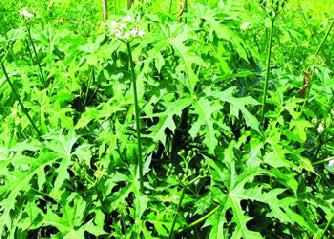Commonly called tree spinach, efo iyana ipaja, or efo Jerusalem (Yoruba), the medicinal value of Cnidoscolous aconitifolius has increased its cultivation and popularity in many parts of the country. A wide variety of claims have been made for its medicinal efficacy as a treatment for numerous ailments ranging from its ability to strengthen fingernails and darken gray hair to providing a cure for alcoholism, insomnia, gout, scorpion stings, memory and vision impairment.
Does it provide relief for insomnia? Experts in a laboratory assessment of the leaves of Cnidoscolous aconitifolius suggested that it is an effective sedative largely owing to its profound depression of central nervous system, by extension it is said to be useful in treating insomnia and anxiety in humans. Most adults have experienced insomnia or sleeplessness at one time or the other in their lives. This is a sleep disorder in which there is loss of ability to sleep or to remain asleep for as long as is desired. Experts estimate that between 30 and 50 per cent of the general population is affected by insomnia, and 10 per cent have chronic insomnia.
In carrying out the study aimed at ascertaining the safety, sedative and hypnotic effects of tree spinach, the researchers tested the extracts of the plant on Swiss albino mice. The 2012 study which was entitled “Sedative effect of hydroalcoholic leaf extracts of Cnidoscolous acontifolius” was published in the International Journal of Applied Research in Natural Products. It was carried out by Adebiyi Olubunnmi Adebiyi, Raji Y. and Adebiyi Oluwafeyisetan Olubolade from the College of Health Sciences, Osun State University, Osogbo in collaboration with Ilesanmi O.R. from Department of Pharmacology, Faculty of Pharmacy, Obafemi Awolowo University, Ile-Ife, Nigeria.
Swiss albino mice were randomly allotted to three groups and treated with tree spinach extract, salt water solution and diazepam. They were observed for signs of toxicity and mortality over a 72-hour period and subsequently for 14 days. In preparing the Cnidoscolous acontifolius hydroalcholic leaf extract (CAHLE), the collected leaves of tree spinach were air dried, made into a powder and then extracted with methanol and water over a 72-hour period.
They found that extracts of tree spinach at doses of 100 mg/kg and 200 mg/kg showed significantly better efficacy compared to 1mg/kg of diazepam. The plant extract significantly increased the onset of sleep in all treated mice groups compared to normal saline and dsodium pentobarbitone treated groups. In fact, lower doses of the extract produced most significant increases in sleeping time. Furthermore, the extract showed greater potency than 1 mg/kg of diazepam, a known sedative.
They wrote: “Although, the CAHLE prolonged sleep latency, CAHLE at a dose of 100 mg/kg increased sleeping time by a factor of 1.7 compared to normal salinetreated group. It also increased the sleeping time at all other test doses compared to normal saline and diazepam treated groups. This ability to prolong barbiturate sleeping time further lends credence to the fact that CAHLE is sedative in action and prolongs sleeping time".
“From this study, it can be concluded that CA extract has sedative action, thus justifying its use among traditional healers to treat insomnia. “The potency of CAHLE makes it an important candidate for further evaluation to isolate or identify important bioactive constituents that may serve as template for the development of new generation drugs for the management of insomnia that afflict a significant percentage of the human population among whom it is a cause of significant morbidity and loss of work hours.’’

 To many people in Lagos and its environs, all that they know about tree spinach, commonly referred to as efo iyana ipaja is that it is like other vegetables. No thought is given to the medicinal uses of its leaves. However, its consumption is good for health.
To many people in Lagos and its environs, all that they know about tree spinach, commonly referred to as efo iyana ipaja is that it is like other vegetables. No thought is given to the medicinal uses of its leaves. However, its consumption is good for health.